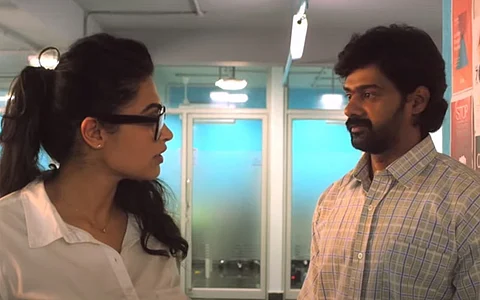
- Reviews
- Power List 2024
- Cannes 2024
- In-Depth Stories
- Web Stories
- News
- FC Lists
- Interviews
- Features
- FC SpecialsFC Specials

Director: Srikanth Nagothi
Cast: Salony Luthra, Naveen Chandra
Bhanumathi Ramakrishna sounds like the title of a film set in the 30s. Yet, if one were to describe the film's plot, you'd have to call it The Proposal, served with a side of gongura. Or would it make more sense to just call it Jab We Met with a gender role reversal? But, wait, what explains such an old fashioned title in a film with an obviously modern setting?
Let me try to explain. This is one of those rare films that begins with a voiceover from the point of view of its female lead. She is Bhanumathi (an expressive Salony Luthra) named after her grandmother, but she goes by Bhanu. Working in a top post in an advertising company, Bhanu is independent and confident and shares her apartment with a live-in couple who speak only in Hindi. She's also been in a long-term long-distance relationship that seems to be going nowhere.
These initial portions are highly derivative and there's always a sense of déjà vu. Her boyfriend bends down to tie his shoelaces and Bhanu assumes he is proposing to her, even when he has no such plans. He says no, she says okay, and that's when the film really begins. As Bhanu explains, "she is extremely anti-drama". So there's no self-loathing and there's no days spent wallowing in his memories. In all honesty, Bhanu isn't even really heart-broken. She wanted to get married just because she had turned 30 and because people expected her to.
So the shocker for Bhanu is not that she's suddenly 30 and single. It's that she was okay to get married to someone she barely loved, worse still, someone she barely even knew. Enter Ramakrishna (a one-note but likeable Naveen Chandra) from small-town Tenali. The contrast between these two characters is a thing the film likes to repeat a few hundred times, just in case we didn't get it. We get shots of Bhanu getting highlights at a mall which then get contrasted with Ramakrishna sitting next to a grinder making dosa batter. She can down several shots at happening pubs but Ramakrishna is a teetotaller. She's okay with casual hook-ups, but Ramakrishna is shy to even give a girl a hand…shake.
But their internal conflicts hold the film together. In terms of personality, Bhanu is as cheerful as a root canal, but Ramakrishna is the kind of guy who brings a tiffin box each for all of his colleagues. If this was a regular film, one may have been tempted to call RK a loosu ponnu, the eternally optimistic village belle with a high CSR rating. But because he's a man, let's go with loosu paiyan or how about Village Balls?
In RK, Bhanu sees stability and reliability, both features you look for in a grinder. As for RK, Bhanu is perhaps a version of his mother he thought he would never find in a big city. But like other strong lead-weaker loosu ponnu relationships, their conflicts aren't particularly dramatic. What this means is while you like both characters, there isn't much else that's going on.
One of the reasons for this is because the film quickly excuses itself from the workplace dynamics of this couple after their connection, even though Bhanu is RK's boss. Another reason could be the way the film's many conversations are staged. With a mix of voiceovers or lines in either English or Hindi, it becomes very obvious pretty soon that the editor was asked to cut away from Salony in instances when she speaks in Telugu. The fact that these dialogues, especially in dramatic scenes, come across as very basic doesn't help either. Spare these, and you get a film that's still very watchable. But like the title suggests, it's just a new take on a very old-fashioned idea.